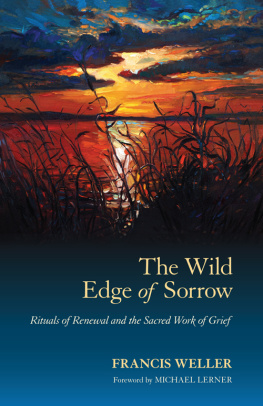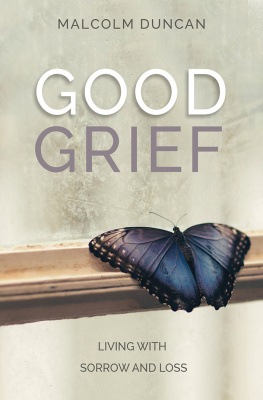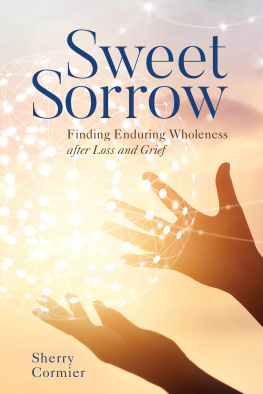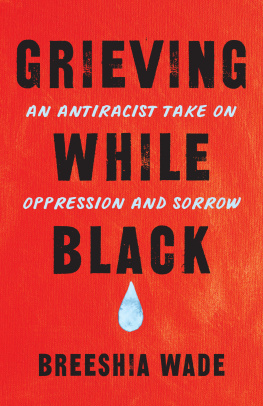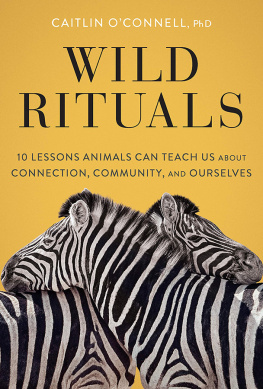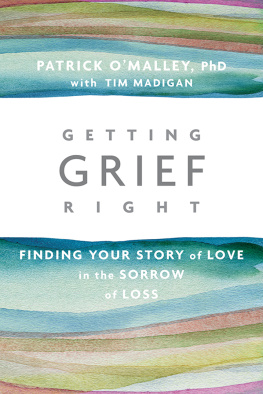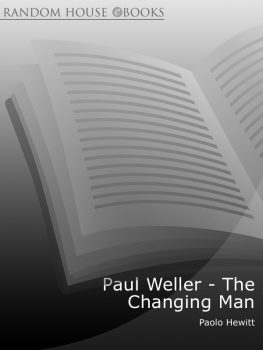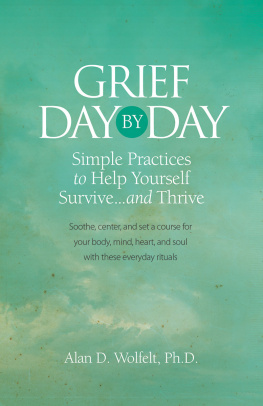Francis Weller - The Wild Edge of Sorrow: Rituals of Renewal and the Sacred Work of Grief
Here you can read online Francis Weller - The Wild Edge of Sorrow: Rituals of Renewal and the Sacred Work of Grief full text of the book (entire story) in english for free. Download pdf and epub, get meaning, cover and reviews about this ebook. year: 2015, publisher: North Atlantic Books, genre: Home and family. Description of the work, (preface) as well as reviews are available. Best literature library LitArk.com created for fans of good reading and offers a wide selection of genres:
Romance novel
Science fiction
Adventure
Detective
Science
History
Home and family
Prose
Art
Politics
Computer
Non-fiction
Religion
Business
Children
Humor
Choose a favorite category and find really read worthwhile books. Enjoy immersion in the world of imagination, feel the emotions of the characters or learn something new for yourself, make an fascinating discovery.
- Book:The Wild Edge of Sorrow: Rituals of Renewal and the Sacred Work of Grief
- Author:
- Publisher:North Atlantic Books
- Genre:
- Year:2015
- Rating:4 / 5
- Favourites:Add to favourites
- Your mark:
- 80
- 1
- 2
- 3
- 4
- 5
The Wild Edge of Sorrow: Rituals of Renewal and the Sacred Work of Grief: summary, description and annotation
We offer to read an annotation, description, summary or preface (depends on what the author of the book "The Wild Edge of Sorrow: Rituals of Renewal and the Sacred Work of Grief" wrote himself). If you haven't found the necessary information about the book — write in the comments, we will try to find it.
Francis Weller: author's other books
Who wrote The Wild Edge of Sorrow: Rituals of Renewal and the Sacred Work of Grief? Find out the surname, the name of the author of the book and a list of all author's works by series.
The Wild Edge of Sorrow: Rituals of Renewal and the Sacred Work of Grief — read online for free the complete book (whole text) full work
Below is the text of the book, divided by pages. System saving the place of the last page read, allows you to conveniently read the book "The Wild Edge of Sorrow: Rituals of Renewal and the Sacred Work of Grief" online for free, without having to search again every time where you left off. Put a bookmark, and you can go to the page where you finished reading at any time.
Font size:
Interval:
Bookmark:
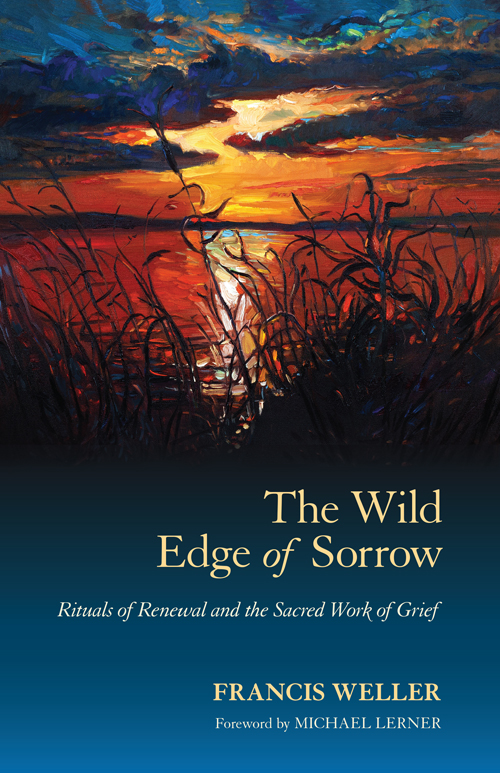
FRANCIS WELLER
Foreword by MICHAEL LERNER

North Atlantic Books
Berkeley, California
Copyright 2015 by Francis Weller. All rights reserved. No portion of this book, except for brief review, may be reproduced, stored in a retrieval system, or transmitted in any form or by any meanselectronic, mechanical, photocopying, recording, or otherwisewithout the written permission of the publisher. For information contact North Atlantic Books.
Published by
North Atlantic Books
Berkeley, California
Cover photo Boyan Dimitrov/Shutterstock.com
Cover design by Suzanne Albertson
Permissions begin on
The Wild Edge of Sorrow: Rituals of Renewal and the Sacred Work of Grief is sponsored and published by the Society for the Study of Native Arts and Sciences (dba North Atlantic Books), an educational nonprofit based in Berkeley, California, that collaborates with partners to develop cross-cultural perspectives, nurture holistic views of art, science, the humanities, and healing, and seed personal and global transformation by publishing work on the relationship of body, spirit, and nature.
North Atlantic Books publications are available through most bookstores. For further information, visit our website at www.northatlanticbooks.com or call 800-733-3000.
Library of Congress Cataloging-in-Publication Data
Weller, Francis, 1956
The wild edge of sorrow : rituals of renewal and the sacred work of grief / Francis Weller ; foreword by Michael Lerner
pages cm
Summary: Through story, poetry, and insightful reflections, reveals how ritual, community, and the sacred restore the original context of grief.Provided by publisher.
ISBN 978-1-58394-976-4 (paperback) ISBN 978-1-58394-975-7 (e-book)
1. Grief. 2. Rites and ceremonies. 3. Mourning customs. 4. Spiritual life. I. Title.
BJ1487.W46 2015
155.937dc23
2015002333
For Joy Parker, dear friend, gifted guide of language, woman of lace.
And for my grandson, Luca. May you know a future brimming with beauty.
Sorrow is part of the earths great cycles, flowing into the night like cool air sinking down a river course. To feel sorrow is to float on the pulse of the earth, the surge from living to dying, from coming into being to ceasing to exist. Maybe this is why the earth has the power over time to wash sorrow into a deeper pool, cold and shadowed. And maybe this is why, even though sorrow never disappears, it can make a deeper connection to the currents of life and so connect, somehow, to sources of wonder and solace.
KATHLEEN DEAN MOORE
I want to acknowledge all those with whom I have had the honor of sharing time in my practice and the many workshops that I have led over the years. You have taught me much of what I understand of grief and how we are able to heal from the accumulated sorrows of a lifetime.
To my dear friends, whose faithfulness and trust in me have encouraged me to persevere in this effort: Richard Palmer, Judith Tripp, Michelle Keip, Larry Robinson, Doug von Koss, Richard Naegle, Kim Scanlon, Patrick Mullin, Bob Hynes, and John Meserve. Your friendship is priceless.
To my brothers and sisters in the Blue Raven Village: Sashana, David, Kim, Bob, John, Fiona, Zack, Diane, Judith, Wayne, John, Jeannie, Travis, and Oliver. Thank you for your constant love and support.
To my mentors: Robert Stein, MD, a true doctor of the soul, Clarke Berry, for your soft and benevolent wisdom, and Larry Spiro, for your keen insight and devotion to the practice of soul-work. You taught me how to sit with others in a soulful way. I am forever grateful. I miss you all.
To Andrew Harvey and Carolyn Baker, for bringing my work to the attention of Doug Reil and Tim McKee at North Atlantic Books. To Vanessa Ta and Jennifer Eastman, for your careful editing and for preserving the spirit of the work.
To those whose lives have helped to shape my own: Carl Jung, James Hillman, Paul Shepard, Malidoma Som, Thomas Berry, Gary Snyder, Terry Tempest Williams, Chellis Glendinning, Michael Meade, Joseph Campbell, Martn Prechtel, Thomas Moore, Derrick Jensen, Robert Bly, Kathleen Dean Moore, David Abram, and all the others who have shown me the ways to live a life of meaning.
To the poets of all time whose words speak the truths of the soul. You have kept the imagination alive during a time when we most need it.
To indigenous cultures everywhere and your fierce protection of your ways and your lands. You help us remember what it means to be human.
To the Russian River Watershed, whose beauty and abundance fills me every day. Thank you, thank you, thank you.
To my son, Christopher. You are a constant source of surprise. May you continue to bring your beauty into the world.
To Victor, who holds so many. May you carry on your grandfathers heart.
And finally, my gratitude to my wife, Judith, for your steadfast support of this work and my soul. Through you I entered a world that sings.
Michael Lerner is president and founder of Commonweal in Bolinas, California. Founded in 1976, Commonweal has programs in health and healing, education and the arts, and the environment and justice. Lerner is cofounder of the Commonweal Cancer Help Program, the Collaborative on Health and the Environment, and The New School at Commonweal.
Survive love and loss, the great French essayist Michel Eyquem de Montaigne advised. His maxim for life compresses the essence of the human dilemma into four words.
Easier said than done, for loss is the other side of the coin of love. The greater the love, the greater the loss. And yet different people respond to loss very differently. When it comes to loss, there are hard-earned skills that can help you survive the unknown terrain in which you find yourself. There are survival skills, there are maps, and there are guides.
Francis Weller is a well-travelled guide to the country of loss. He can teach you the survival skills. He can show you the maps. He carries his knowing of sorrow in his bones. He writes as someone who has been unmade in the way loss unmakes us.
He is not afraid to tell us so.
Im not sure how or when I began my apprenticeship with sorrow. I do know that it was my gateway back into the breathing and animate world. It was through the dark waters of grief that I came to touch my unlived life.... There is some strange intimacy between grief and aliveness, some sacred exchange between what seems unbearable and what is most exquisitely alive. Through this, I have come to have a lasting faith in grief.
Weller coleads weeklong retreats with me in the Commonweal Cancer Help Program. We sit together many evenings in these retreats and hear stories of love and loss.
We know that listening and honoring these stories makes a difference. He also leads his own retreats on grief and loss. I know some of those who have attended his retreats. I know from their accounts that these retreats too make a difference.
The Wild Edge of Sorrow: Rituals of Renewal and the Sacred Work of Grief brings together Wellers wisdom from decades of work with grief and loss.
Every one of us must undertake an apprenticeship with sorrow. We must learn the art and craft of grief, discover the profound ways it ripens and deepens us. While grief is an intense emotion, it is also a skill we develop through a prolonged walk with loss. Facing grief is hard work.... It takes outrageous courage to face outrageous loss. This is precisely what we are being called to do.
Font size:
Interval:
Bookmark:
Similar books «The Wild Edge of Sorrow: Rituals of Renewal and the Sacred Work of Grief»
Look at similar books to The Wild Edge of Sorrow: Rituals of Renewal and the Sacred Work of Grief. We have selected literature similar in name and meaning in the hope of providing readers with more options to find new, interesting, not yet read works.
Discussion, reviews of the book The Wild Edge of Sorrow: Rituals of Renewal and the Sacred Work of Grief and just readers' own opinions. Leave your comments, write what you think about the work, its meaning or the main characters. Specify what exactly you liked and what you didn't like, and why you think so.

